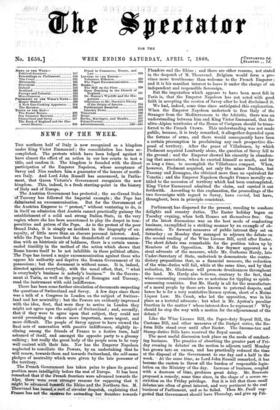NEWS OF THE WEEL
THE northern half of Italy is now recognized as a kingdom under King Victor Emmanuel ; the consolidation has been ac- complished. The protests which have been lodged against it have almost the effect of an action in our law courts to test a
title, and confirm it. The kingdom is founded with the direct participation of the Emperor Napoleon, whose acceptance of Savoy and Nice renders him a guarantor of the tenure of north-
ern Italy. And Lord John Russell has announced, in Parlia- ment, that Queen Victoria's Government recognizes the new kingdom. This, indeed, is, a fresh starting-point in the history -of Italy and of Europe. ern Italy. And Lord John Russell has announced, in Parlia- ment, that Queen Victoria's Government recognizes the new kingdom. This, indeed, is, a fresh starting-point in the history -of Italy and of Europe.
The Austrian Government has protested ; the ex-Grand Duke of Tuscany has followed the Imperial example ; the Pope has fulminated an 'excommunication. But for the Government of the Austrian Emperor to "protest," without venturing to do, is in itself an admission that Austria cannot practically gainsay the establishment of a solid and strong Italian State, in the very region where she has been accustomed to play the despot in tem- poralities and patron of the Pope. As to the protest of the poor Grand Duke, it is simply an incident in the biography of ex- royalty, of little more than an obscure personal interest. And, while the Pope has launched the thunderbolt of excommunica- tion with an histrionic air of boldness, there is a certain uncon- cealed timidity in the method of the action which shows that
-Rome knows itself to be not infallible in these political affairs.
',The Pope has issued a major excommunication against those who oppose his authority and deprive the Roman Government of its possessions ; but the document is without name. It is, indeed, directed against everybody, with the usual effect, that, "what is everybody's business is nobody's business." So the Govern- ment at Turin, as well as the people of Romagna and Tuscany, read the instrument with cold indifference.
There has been some further circulation of documents respecting the questions of Switzerland and Savoy. A few days since there was a talk of a Congress in London on the subject of Switzer- land, and her. neutrality ; bat the Powers are evidently impressed -with the idea, first, that were they to arrive in London they might not agree upon the subject of Switzerland ; and, secondly, that if they were to agree upon that subject, they could not avoid proceeding to others more important, more urgent, and more difficult. The people of Savoy appear to have viewed the final acts of annexation with passive indifference, slightly in- clining among the friends of France to a festive turn, half ashamed of itself, and amongst the opposite party to a gloomy sulking ; but really the great body of the people seem to be very well content with their fate. Nor has the Emperor Napoleon neglected to conciliate the Powers by an undertaking that he will renew, towards them and towards Switzerland, the self-same pledges of neutrality which were given by the late possessor of the territory.
The French Government has taken pains to place its general position, more intelligibly before the rest of Europe. It has been
-remarked that if the French frontiers were advanced towards the Alps, there were even stronger reasons for supposing that it might be advanced towards the Rhine and the Northern.Sea. M. Thouvenel has issued a sort of circular despatala, explaining that France has not the motives for extending her frontiers towards
Flanders and the Rhine ; and there are other reasons not stated
i the despatch of M. Thouvenel. Belgium would reasons, a pro- vince more troublesome than welcome to the French Emperor ; and it is his manifest interest to leave it under the charge of an independent and responsible Sovereign.
But the imputation which appears to have been most felt in Paris is, that the Emperor Napoleon has not acted with good faith in accepting the cession of Savoy after he had disclaimed it.
We had, indeed, some time since anticipated this explanation. When the Emperor Napoleon undertook to free Italy of the Stranger from the Mediterranean to the Adriatic, there was an understanding between him and King Victor Emmanuel, that the ultra-Alpine territories of the House of Carignan should be trans- ferred to the French Crown. This understanding was not made public, because, it is truly remarked, it altogether depended upon the fortune of arms, and there would consequently have been a certain presumption in proclaiming any such prospective dis- posal of territory. After the peace of Villafranca, by which Piedmont acquired Lombardy alone, the ,question of Savoy fell to the ground ; and the Emperor showed his sincerity in abandon- ing that annexation, when he exerted himself so much, and for so long a time, to accomplish the Villafranca compact. When, however, Piedmont acquired, not only the minor Duchies, but Tuscany and Romagna, she obtained more than an equivalent for Venetia ; and the Emperor Napoleon thought France morally en- titled to the accession of territory which had been contemplated. King Victor Emmanuel admitted the claim, and carried it out forthwith. According to this explanation, the proceedings of the two Sovereigns with regard to Savoy, have varied, but have, throughout, been in principle consistent.


























